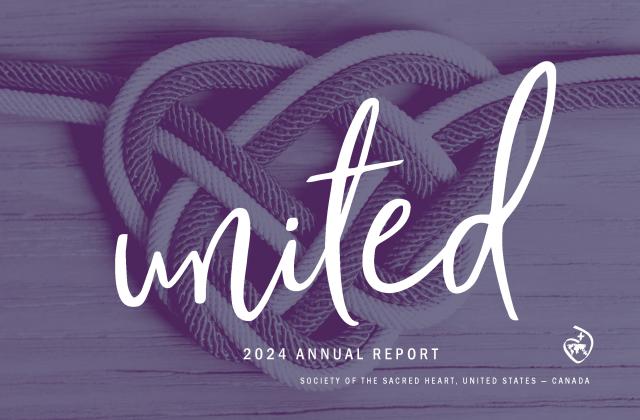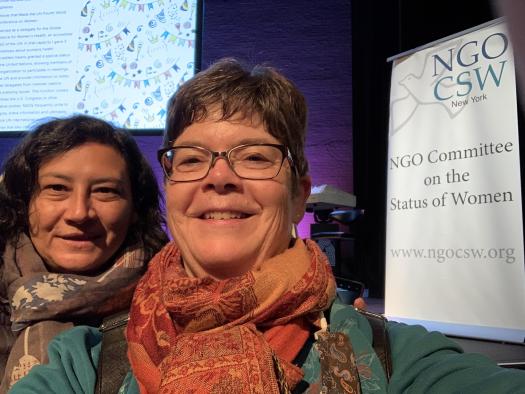
This year the Society of the Sacred Heart represented by Sacred Heart at the United Nations — an official non-governmental organization (NGO) — participated in the 66th Commission on the Status of Women (CSW66).
The 66th session of the Commission on the Status of Women took place from March 14 – 25, 2022. “During the Commission’s annual two-week session, representatives of United Nations(UN) Member States, civil society organizations and UN entities gather at UN headquarters in New York.” (UN Women website.)
The priority theme of CSW66 was, “Achieving gender equality and the empowerment of all women and girls in the context of climate change, environmental and disaster risk reduction policies and programmes.” Due to the continued impact of the COVID-19 pandemic, CSW66 took place in a hybrid format. This meant that all side-events and parallel events were virtual.
Religious of the Sacred Heart (RSCJ), alumna from Network of Sacred Heart schools, and Society partners in mission participated in CSW66 in the following ways:
Consultation Day
Silvana Ferez, RSCJ, of the Argentina – Uruguay Province and Sheila Smith, RSCJ, the Society's UN-NGO representative, attended the orientation day that was sponsored by the NGO CSW Forum, which is a civil society meeting that runs parallel to the official program of CSW organized by UN Women. The NGO Forum was held on March 13 at the Apollo Theatre in New York. The purpose of the event was to prepare members of NGOs to participate in CSW66.
Prayer
Rita Pinto, RSCJ, of the Province of India, and Sister Smith moderated prayer during one of the reflection opportunities provided by the Justice Coalition of Religious (JCoR) during CSW66. The topic for reflection was “Health and Well-Being.” Sister Pinto and Sister Smith integrated the topic with meditation and reflection on our Sacred Heart Mission to promote human dignity. A recording of the prayer will be available soon on the UN-NGO page of the JPIC Learning Hub.
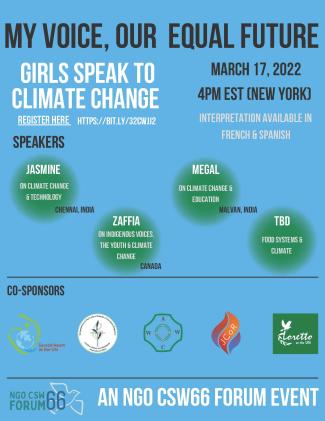
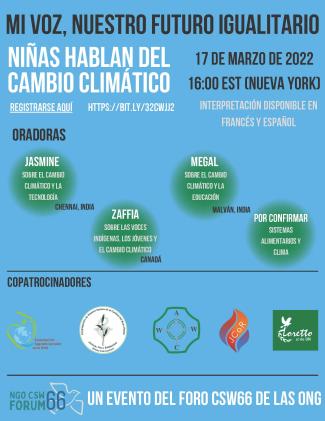
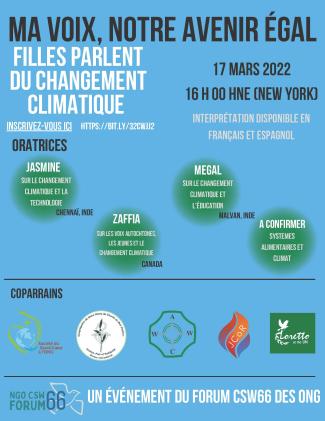
Parallel Event
Sacred Heart at the UN organized a parallel event that was held on March 17, 2022. The topic was, “My Voice, Our Equal Future: Girls Speak to Climate Change”. The event joined the themes of International Day of the Girl 2021 with the theme of CSW66. It provided space for a global, virtual conversation among girls, who discussed their contributions to climate justice, the obstacles they see, and their hopes for the future. In Our Common Agenda, UN Secretary General, Antonio Gutteres, mentions youth 39 times. He writes, “Listen to and work with youth”. A focus on youth is also part of the Society's mission. Our parallel event sought to do just that – with a specific focus on girls. Girl advocates approached climate change from the perspectives of education, technology, food systems, Indigenous voices, and period (menstrual) poverty.
Several members of the Sacred Heart family participated in this event.
- Alexandra “Sasha” Amelang, a Sacred Heart alumna '20 and UN-NGO student volunteer, co-hosted the event with a student volunteer with our partner in mission, the Loretto Community at the UN.
- Lisabeth Kelly, a Sacred Heart alumna and UN-NGO student volunteer, connected the Sacred Heart campaign for International Day of the Girl with CSW66. She presented two videos by Sacred Heart students at Sophia Junior College in Mumbai, India.
- Rajasi and Uttra, current Sacred Heart students from Sophia Junior College, encouraged by their teacher, Nivedita Iyer, prepared two videos and presented on the intersection of climate change, gender inequality and menstrual poverty.
- Megal, a parishioner from Malvan in the Shidhudurg District, Maharashtra, India, and supported by Sister Pinto, presented on the intersection between education and climate action.
- Our partners in mission at the UN who cosponsored the event were the Associated Country Women of the World (ACWW), Congregation of Our Lady of Charity of the Good Shepherd, JCoR, and the Loretto Community.
Many in the Sacred Heart family registered and attended the event from around the globe. The recording of the event can be viewed in English and Spanish on the JCoR website.
Joint statements
The following joint statements were prepared, signed or endorsed by the Society of the Sacred Heart:
- JCoR
- Among the projects of JCoR member congregations that are mentioned in this statement, it was noted that the Society of the Sacred Heart in Mexico has integrated environmental sustainability into the curriculum and culture of their schools.
- Congregation of Our Lady of Charity of the Good Shepherd
- Associated Country Women of the World
Events co-sponsored
- Mercy International Association: “Women’s Leadership and Resilience in the Face of Climate Change”. The Society of the Sacred Heart co-sponsored this parallel event that was organized by our partner in mission, Mercy International Association/mercy Global Action. The event brought together women and girls from the Americas, Africa and Asia Pacific who shared their experiences and recommendations on climate change resilience. They discussed the impacts of the COVID-19 pandemic and the effects of the emerging climate crisis on loss of livelihoods and water and food insecurity, which in turn exacerbates women's issues. Various perspectives from the field highlighted how women’s participation drives creative and sustainable solutions to both the climate emergency and social injustices. A recording of the event can be viewed on the Mercy International Association Facebook page.
- NGO Committee on Migration and UN Committee on Financing for Development: “Feminist and Decolonial Approaches to Climate-Induced Migration, Loss and Damage”.
As a member of the NGO Committee on Migration, the Society of the Sacred Heart participated in the planning of this parallel event. We also secured one of the panelists, Keira Loukes, from Canada. Keira presented an Indigenous perspective to the intersection of food security and climate action. She uses decolonial and feminist lenses in her area of food related research. A link to the recording of the event will be posted on the JPIC Learning Hub as soon as it becomes available.
In brief, our events and statements call on the Member States of the United Nations to enhance gender equality and to take climate action that complements the efforts of civil society in some of the following areas:
- Develop national standards and provide support for the integration of environmental stewardship and gender equality education in primary and secondary curricula
- Negotiate waste responsibility programmes with multi-national corporations
- Ban gender-based restrictions on land rights, inheritance rights, and access to financial services
- Require gender composition of all governmental ministries relating to environmental sustainability
- Establish or enhance youth representation in national governmental ministries relating to environmental sustainability
- Discourage monoculture, chemical fertilizers, and genetically modified seeds and incentivize crop diversification and small-scale, sustainable farming practices, especially through micro-loans to women and girls
- Commit to a just transition to clean energy
- Eliminate child labour
- Increase the environmental protection budget and develop a clear and decentralized fund distribution policy
- Safe migration pathways for those who are forcibly displaced by environmental degradation or destruction
Conclusion
At the conclusion of CSW66, UN States agreed upon the following conclusions to help achieve gender equality and the empowerment of all women and girls in the context of climate change, environmental and disaster risk reduction policies, and programmes:
- Normative, legal and regulatory frameworks that ensure the full and equal enjoyment of human rights and fundamental freedoms without discrimination of any kind including in the context of climate change, environmental and disaster risk reduction policies and programmes;
- Increase gender responsive finance, capacity building and mobilization of funds related to climate initiatives and responses
- Strengthen the capacity and coordination of national statistical and data production offices and government institutions to collect, analyse, disseminate and use data and statistics on climate change, environmental degradation and disasters, including data disaggregated by sex
- Just transition from informal to formal work in all sectors
The outcome document of CSW66 can be accessed by clicking this link. While the actions of UN States is markedly slow, their agreed upon conclusions are now concrete points for civil society to use in our work of demanding action by our governments.


